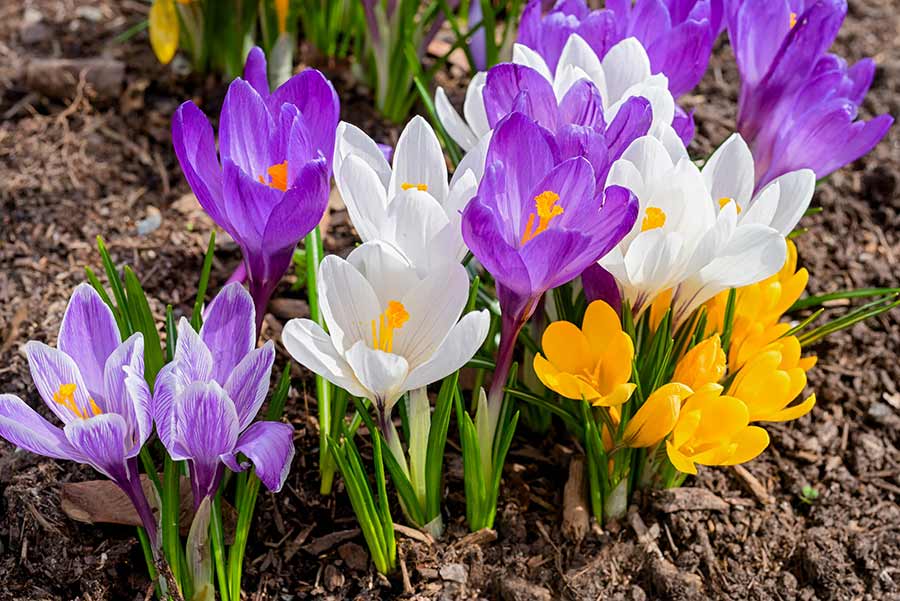
Stephen
Terry, Director


Wait
on the Lord
Commentary
for the March 30, 2024, Sabbath School Lesson
 "See! The winter is past; the rains are
over and gone. Flowers appear on the earth; the season of singing has come; the
cooing of doves is heard in our land." Song of Songs, 2:11-12
"See! The winter is past; the rains are
over and gone. Flowers appear on the earth; the season of singing has come; the
cooing of doves is heard in our land." Song of Songs, 2:11-12
As I write, we have passed the
vernal equinox. Winter is past. The daylight hours are lengthening, and the sun
is caressing everything with increasing warmth to coax forth leaves and blooms
as a reminder that as surely as the dead of winter follows fall, so resurgence
of life follows that somber season. Soon summer will follow the bright promise
of spring with even more verdant displays as apian angels knock at the door of
every blossom with the good news that life has returned and will thrive once
again. Dusting pollen everywhere they visit to ensure the fertility of that
promise, the petaled doors open freely to these humble messengers, humming a
chorus whose words seem known to all of creation save one species.
All of nature rejoices and in
doing so praises the Creator who brought forth beauty in a formless void.[i] Annually,
the celebration of that creation recurs anew for all things. But most of humanity
has forgotten the words to that song. They cannot even hum the tune. Some even
go as far as to claim the tune is vile and that anyone who sings it is a dolt
who understands nothing. Rather than seeking to live in harmony with the song,
they strive to bend nature to their will, demonstrating their power and control
over the meeker realms. Realms that have every right to rely on the strength
and intellect of humanity for support but instead receive only disdain.
Every year, spring is greeted
with millions of gallons of chemicals poured on farms and urban landscapes
alike, murdering flora and fauna in the service of uniformity. This is what heaven
looks like to some, a place where everyone is forced to live lockstep with one
another and with those that deviate from an ideal pattern cut from creation just
as a tailor or seamstress will use their pinking shears to trim away anything
that falls outside the pattern when making a new outfit. However, what works
for a new dress, does not work for nature. The poisons kill so many things that
are vital to our own well-being. In the interests of having a well-manicured
and evenly green lawn, we are willing to destroy the pollinators who make
abundant harvests of fruit and vegetables possible. While people have commented
about how few pollinators remain under this toxic onslaught, a far more
insidious yet hidden danger is the load of these poisons that have moved up the
food chain to lodge in our own tissues. The toxic load includes not just
pesticides and herbicides but microplastics and forever chemicals that our bodies
will never be free of until the day we die. How we came to believe the lie that
poisoning everything was good for us is a mystery, but it reminds us of the one
that once promised in a garden long ago beneath a certain tree, "You shall not
surely die."[ii]
So, what are we to do? Some would
advocate moving from the cities to the country, living in harmony with
creation. While there are advantages to that lifestyle, it is not attainable
for everyone. It also is not the panacea it appears. Over two decades ago, I
had a small, five-acre farm about an hour from the city. While it was nice to
be able to grow crops there, I discovered that it was not an escape from crime.
It also was not an escape from the mindset of those who want to poison
everything. When I had my well water evaluated, it contained over two dozen
chemical pollutants. When I consulted with the Department of Ecology, I was
assured that none of those chemicals were present at levels deemed unsafe by
the government. I asked, "What about when you have so many chemicals present at
low levels and the cumulative effects of that?" They had no answer as no one
had ever studied that. To my mind, that is like saying because a person will survive
being stabbed by a small knife, then they will survive being stabbed two dozen
times by the same knife. In like manner, one person
may look at their golf-course-like yard and feel that the impact on the environment
is negligible. But one person's desires over the needs of their fellows induces
a myopia that has difficulty recognizing the effects can be cumulative and can rebound
negatively to them as well. Sadly, if they eventually see the result in terms
of ill health or shortened life spans, it is easier to deny it was caused by the poisons than to swim upstream against the opinions
of humanity and its slipshod manner of caring for the planet.
Would such individuals, faced
with a renewed earth[iii] that will likely contain
insects because they are so necessary to life as we know it, again want to fill
the environment with poisons instead of living in harmony with creation? That
would be less than heavenly. Even worse, we stand at the threshold of space. Is
it our aim to carry such practices to the stars should time last so long and
technology advances to the point that interstellar travel becomes feasible? Already,
we have begun littering our planetary system with one-way vehicles and their
associated detritus. The problem of our disregard for the environmental
consequences of our actions seem to contraindicate any hope for a heaven on
earth based on either our willingness as a species to strive for that goal or
to have the technological means to roll back all the damage to an Edenic equilibrium.
While the Bible tells of post-Edenic life spans that lasted for centuries, our much
shorter life spans today are not conducive to ever seeing much change before we
die. To work toward a healthier future requires the kind of individual that
will plant a tree when they are old knowing they will never sit in its shade.
We need to be able to see down that road farther than we will ever travel.
Maybe, none of that is likely to
happen. Humanity seems bent on the idea of conquering creation as opposed to
living in harmony with the world we live in. If we cannot free ourselves from
the mental cage that keeps us trapped in that way of thinking, the Bible may be
right. Only an apocalyptic event will bring about change. Sadly, should such a
thing happen, there would be those who would blame God for allowing such a
catastrophe. But the real individual responsible is the one staring back at
them from the mirror. Shirking one's responsibility for where we are today is
like claiming to be an environmentalist but never picking up the trash in one's
yard. Genesis tells us that when God created humanity, he put them in the
Garden of Eden to care for it. It makes sense, therefore, that there are
lessons to be learned about our place in the universe and our relationship with
one another that can grow out of that gardening experience. If, as the Bible
suggests, that garden will one day be recreated,[iv] it
also makes sense that how we transit this life and the lessons we learn can
have direct application to that future.
I no longer have that small farm
in the country. Old age and health issues make it impossible for me to maintain
acreage anymore, but I do have a home and a yard in the suburbs of a nearby
city, and I do what I can to maintain a balanced biome within that smaller
space. Even with the smaller space, it can be challenging to maintain in old
age. I envy those who were reputed to have lived for as long as a millennium
without diminished strength and intellect. Nonetheless, I do not wish to be the
one who develops the kind of yard a crotchety, old "get-off-my-lawn" man might
have. I prefer a yard that is welcoming and filled with delightful butterflies,
bees, ladybugs, and birds. A yard that may not look like a putting green but is
alive with wonder and amazement for child-like curiosity carries a whisper to
each heart, the quiet voice of Eden. That voice speaks and our hearts answer as
we feel a yearning for humanity's sylvan past. Those who have walked through a
cornfield on a summer day and felt the sudden rush of the oxygen-rich air the
cornstalks produce have felt a little of the nearness of Eden. Every child who
has pulled a carrot from the ground or shelled peas freshly harvested has a
precious experience that will always be remembered because the hardwiring in
our DNA tells us this is right. Whether humanity ever as a whole rediscovers
the call of Eden within our genes, or we are forced to wait until an apocalypse
sets things right again, I will continue to seek ways to keep Eden in my heart.
My prayer is that we all rediscover that paradise.